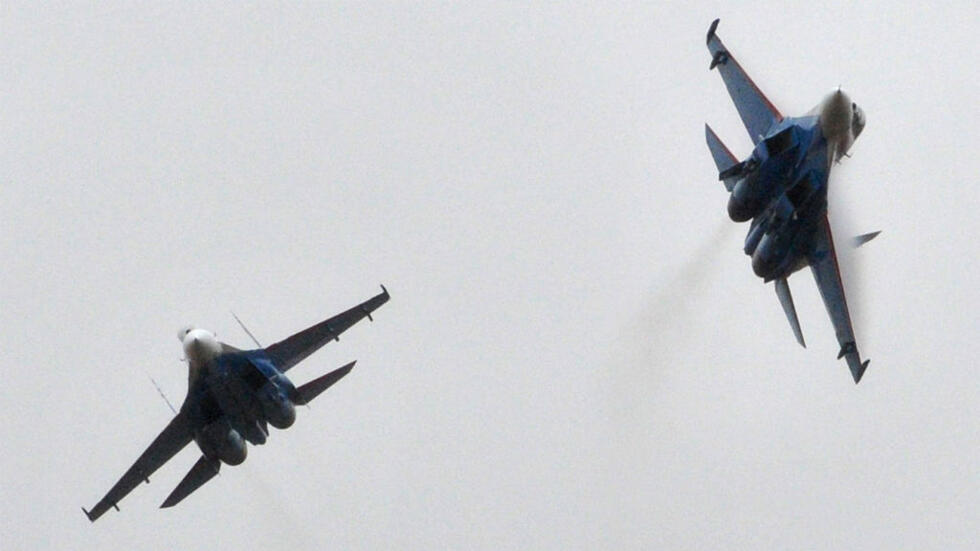Russian war planes stoke Western fears amid Ukraine crisis
NATO officials are concerned about long-range flights by Russian war jets encroaching on European airspace, amid ever increasing East-West tensions over Ukraine.
Issued on: Modified:

European leaders are meeting with Russian President Vladimir Putin in Minsk on Wednesday in a last-ditch effort to put an end to the conflict in Ukraine, which after 10 months of bloody violence is stoking fears of a new Cold War.
Western countries are eyeing Moscow suspiciously as it continuously fattens its defence budget, appears to fuel violence in eastern Ukraine, and launches myriad military exercises near – and even far – from its borders. A particularly worrying development is the increased number of Russian war planes that have become a nuisance over European skies.
Last week, the North Atlantic Treaty Organisation (NATO) military alliance announced it had intercepted Russian aircraft more than 400 times last year, insisting the jets posed a danger to civilian flights.
Russian flights and exercises are being executed without prior announcement to concerned countries, and in some cases without the aviation instrument normally used to alert civilian aircraft or air traffic controllers on the ground about their presence, increasing the possibility of collisions.
However, that is not all that worries NATO.
“These Russian flights are taking place increasingly close to territorial airspace of European powers. Most recently, we saw a new incident along the French coastline,” Alexandre Vautravers, a professor at Webster University and a European military expert, told FRANCE 24.
The Geneva-based researcher was referring to a January 28 incident in which two Tupolev Tu-95 bombers, planes capable of transporting nuclear arms and known by their NATO classification as Russian "bears", were spotted flying near the English channel.
“These are not flights that are simply happening along the border between Russia and Finland. These are flights lasting several hours and flying close to British, French and Dutch territory,” Vautravers noted.
Meanwhile, Moscow is reviving Soviet-era airfields and ramping up air fleets. Russian officials claimed the air force received more than 250 new planes and helicopters last year and is set to receive more than 200 this year.
‘Cold War’ misleading
The flights are ruffling feathers after Russia flexed its military might in Crimea and, according to Western leaders, keeps arming separatist rebels and deploying soldiers in Eastern Ukraine.
Lawmakers in the United States on Tuesday called for $1 billion in military aid to help Ukraine defend itself. “It seems Russia has decided to go back to the Cold War,” Democratic congressman Adam Smith told reporters about the bill that would deliver training, equipment and lethal weapons to Kiev.
According to Vautravers, using the term “Cold War” to describe the current situation was an unfortunate, but also dangerous, trend.
“The term Cold War is a very convenient comparison, for military staff and politicians, especially senior ones who perhaps started their diplomatic careers during the Cold War. International affairs were simpler then,” he said.
“But the comparison does not hold true. The state of military readiness that was in place during the Cold War is above what it is today. It is also being used in terms of the arms race, and the increase in Russia’s military budget. But in terms of weapon procurement and development we are not near previous levels,” Vautravers added.
David Galbreath, a professor of international security at the University of Bath and in the editor-in-chief of the journals European Security and Defense Studies, agreed the term was a convenient comparison for commentators.
“It’s an easy comparison because we know the Cold War, many of us lived through it, and the term has for so long framed our discussion about Russia,” Galbreath told FRANCE 24. “But it’s very debatable. It does not necessarily match what is happening on the ground militarily, or how leaders are thinking in Moscow, or even in Brussels and Washington.”
The British scholar said that alarm over an eventual return to the Cold War was paradoxically reinforcing the idea of a new East-West standoff. “People are using the term Cold War to warn ourselves about going back to that time in history, but by evoking the term so often we are constraining ourselves to it,” he said.
Military bravado
While tossing around the term Cold War may be obscuring Moscow’s actual geopolitical goals, Galbreath argues that Russia under Putin has nonetheless favoured military strategy over diplomacy. He said after repeated failures by Russia’s foreign ministry to impact the course of world conflicts, from Kosovo to the Iraq war, it has clearly become subservient to Russia’s defence ministry.
The surge in Russian flights encroaching on European airspace is consistent with Moscow’s growing penchant for military bravado.
“Moscow is sending several messages, but first of all there is an internal message to the Russian public. It is that ‘We are going back to being a powerful nation with forces capable of posing a threat far from our own borders’,” said Vautravers. “This message is also being project outwards, and the public outside Russia is of course very sensitive to it.”
The military expert said the crisis in Ukraine had exposed divisions within NATO, with Eastern partners calling for increased spending and more troops permanently deployed in their countries, with others, notably the United States, wanting to scale back.
In a telling episode in January, Lithuania’s Defence Ministry issued a guide telling citizens of the small Baltic state how to survive a foreign invasion and occupation. The manual makes no specific reference to Russia, but includes advice on how to react to soldiers wearing no insignia – a clear reference to Russia’s military occupation of Crimea last year.
Russia’s aggressive attitude, including provocations made by sending warplanes dangerously close to Western airspace, demands a coherent and strong response from the West, according to Vautravers.
“This is the ‘raison d'être’ of NATO, that is to provide security to its members, especially its smaller members,” he said.
Daily newsletterReceive essential international news every morning
Subscribe